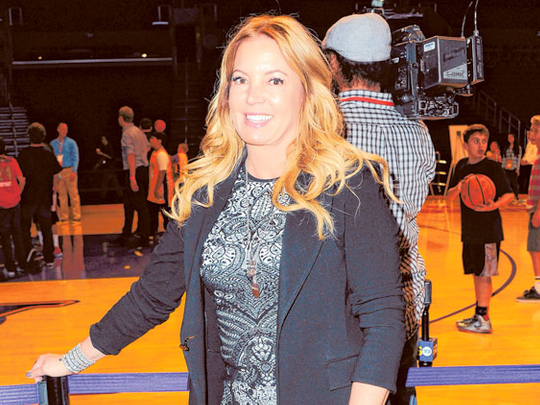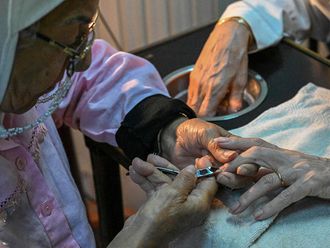
Buss is the most important woman in sports
At a time when Sheryl Sandberg and Beyoncé want to “Ban Bossy”, Jeanie Buss is putting to rest the question of who’s really in charge in Los Angeles.
The Lakers president gave an interview with ESPN Radio in Los Angeles last week, reinforcing her place at the top of a front office that has been viewed as fragmented since the death of her father, Jerry Buss, in February 2013.
“I’m the boss,” Jeanie Buss said. “I am responsible ultimately for anything with the team and decisions that are made.”
Buss stressed that she is by no means running the team as a dictator, taking care to build a consensus among shareholders when it comes to major decisions and “empower people that are in positions to do their jobs”. That includes general manager Mitch Kupchak and her brother Jim Buss, who serves as executive vice president of player personnel.
While she emphasised the pair’s responsibility for day-to-day basketball operations, she also underscored that all decisions — whether on the business side or on the court — must go through her.
“Ultimately I am the one voice,” she said. “I am that person. I’m at the top of the food chain.”
Such declarations are important for a Lakers team that has struggled to find its front office identity since Jerry Buss’s death yielded power to the six Buss siblings — the team’s majority owners and shareholders — and put Jeanie and Jim at odds on how to run the franchise. They are also a major departure from Jeanie’s previously conciliatory tone when discussing her relationship with her brother; in August, she told the Hollywood Reporter that Jim ultimately makes the basketball decisions.
“I defer and will continue to defer because that’s what my dad believed would be successful,” Jeanie said then. In that same interview, however, she voiced her frustrations at not always being involved in the decision-making process, especially given her position as president and governor, which, in the eyes of the NBA, puts her in charge.
“To be held accountable by the league and not have a seat at the table when decisions are made is hard,” she said.
In the months since, it appears Jeanie has reclaimed the reins — giving her brother and general manager the space to do their jobs while reminding everyone that she has final say in all aspects of the team’s operations. In reaffirming her power, Jeanie has become the most important woman in sports.
Although women have made great strides in front offices, there is still a huge disparity, especially when it comes to making decisions on the field. Most high-powered women in sports tend to stick to the business and marketing side while leaving team operations to the men.
There are a few notable exceptions, of course: As executive vice president of football administration for the Miami Dolphins, Dawn Aponte is responsible for negotiating player contracts and navigating the team’s salary cap. Kim Ng, senior vice president of baseball operations for Major League Baseball, was the first woman to present a salary arbitration case and was a serious candidate to become the first woman general manager in any sport not too long ago.
But last year also saw the departure of two of sports’ most influential woman executives: Heidi Ueberroth, who stepped down as president of NBA International, and former Oakland Raiders CEO Amy Trask, once called the most powerful woman in the NFL. For all her deserved accolades as a trailblazer for women in sports, Trask is a polarising figure akin to Sandberg, whose major contribution to modern feminism has largely been to blame women for their second-class status in society rather than the system that furthers their subjugation. Unlike Sandberg, Trask has never claimed to be a feminist, but she has echoed the belief that women get in their own way when fighting for a place in a male-dominated industry.
“I firmly believe that if a woman doesn’t want her gender to be an issue in her employment then she shouldn’t make her gender an issue,” Trask said in 2001.
Although there is something to be said for some of the behavioural disparities that might hold water — women are less aggressive in asking for raises, for example — ignoring the institutional biases because of a few successful cases is myopic and naive. In 2002, Fox Sports reported that only 13 per cent of sports executives were women, with a notable dearth at the top of the organisational structure.
Perhaps this is unsurprising, given the difficulties woman athletes have faced in gaining equal standing, as well as the lack of woman executives in other business realms. According to a Catalyst census of Fortune 500 companies released in December, women hold only 16.9 per cent of corporate board seats, and only 14.6 per cent of executive officer positions — both numbers reflecting zero change from the year before. It could be argued, then, that the lack of woman team executives is only in keeping with the broader trends of gender disparity in the workplace.
But women striving for front office positions face a unique set of obstacles. In addition to the usual challenges confronting women in business — fewer networking opportunities, old-school values of patriarchy, the lack of flexible work schedules and child care, and the perception of weakness of traditionally “feminine” personality traits — women seeking higher-level sports positions often find themselves at a disadvantage when it comes to prior work history. There is a strong expectation that those in charge of team operations (both men and women) have at least some experience playing the sport on the professional level. This presents an obvious hurdle to women in sports such as football, baseball and hockey, for which there are no major-league woman equivalents.
Having inherited her position as the head of the Lakers, Jeanie didn’t have to deal with that particular barrier of entry. But unlike many of her contemporaries, she isn’t content being relegated to the business side and is ready to prove that a woman can lead all aspects of a team’s operations. Her recent affirmation of her power is enough to make those on both sides of the “bossy” debate proud — she is the boss, after all.
Once excluded from her seat in the decision-making process, Jeanie hasn’t just demanded her spot. She’s assumed her rightful place at the head of the table.
— Washington Post











